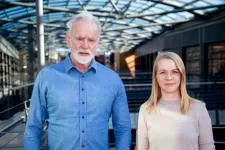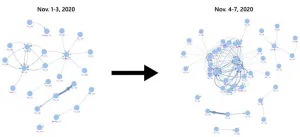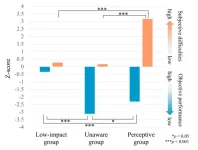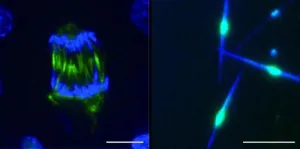(Press-News.org)
29 October 2024. Doha, Qatar – The World Innovation Summit for Health (WISH), an initiative of Qatar Foundation, has shortlisted 12 innovators for two awards within the 2024 WISH Global Healthcare Innovation Competition. Selected from more than 150 applications, the 12 will showcase their groundbreaking innovations to global policymakers and healthcare leaders at this year’s summit in Doha, 13-14 November.
In addition to the chance to receive one of two investment awards of US$10,000, shortlisted innovators will have access to mentoring sessions with industry experts to learn about marketing, social media, presenting, and pitching to investors. They also benefit from networking opportunities at WISH, an event that brings together healthcare providers, policymakers, investors, and industry experts.
Eman Tag, Head of Innovation at WISH, said: “We are excited to bring together at WISH 2024 bright entrepreneurs and innovators, whose inventions and startups are aimed at making global healthcare more affordable, sustainable and accessible. These competitions aim to provide them with a platform to nurture their innovations at a key stage in their development, empowering them to continue to develop these transformative health solutions.”
This year’s competition benefits from a being delivered in partnership with Qatar Research Development and Innovation Council (QRDI), a Qatari organization dedicated to advancing research, fostering global innovation collaborations and attracting global talent to the Gulf state.
This year’s competition benefits from being delivered in partnership with Qatar Research, Development, and Innovation (QRDI) Council, a government entity with the mission to support research, development and innovation (RDI) activities as well as to develop RDI talent in Qatar.
“We are proud to partner with WISH in driving innovation that tackles pressing global health challenges,” said Nada Al-Olaqi, RDI Program Director, QRDI Council. “The 2024 Global Healthcare Innovation Competition showcases the strength of collaboration in transforming healthcare. By supporting these forward-thinking innovators, we aim to further establish Qatar as a hub for cutting-edge solutions that improve health outcomes worldwide. QRDI Council is committed to empowering innovators through its funding programs and platforms, helping them grow and scale their solutions to tackle critical global health issues.”
The competition award committee will announce a winner within each of the two award categories: “Young Innovators” and “Innovation Showcases”, during the WISH closing ceremony on 14 November.
The “Young Innovators” category is an opportunity designed exclusively for health startups led by founders aged 30 years and younger and seven candidates have been shortlisted for the Young Innovators competition. They are: 1) Luma Makari of the United Arab Emirates, with Elggo, an AI-powered mental health platform promoting well-being in school children across the Middle East and North Africa; 2) Abel Teo Jun Hieng of Singapore, with Castomize Technologies, a MedTech company making novel medical devices with 4D printing technology; 3) Vijay Ravichandiran of India, with MANK Medical Devices Private Limited and the invention of a non-invasive, cost-effective and disposable tourniquet for use with hemodialysis patients; 4) Dr Nawal Yousaf of the United Kingdom, with Fitra Health, which offers healthcare providers in the Gulf Cooperation Council countries culturally inclusive mental health solutions; 5) Alessandro Vingione of Italy, with GenoGra, whose user-friendly software platform enables bioinformaticians to run cutting-edge pan-genomic analyses; 6) Mustafa Şandverdİ of Turkey, with Metatip Sağlik Teknolojileri A.Ş (MetaTıp Health Technologies inc.), a company pioneering 3D scanning, 3D printing, and virtual reality to transform the way anatomy and surgical education are delivered and 7) Ayya Azzahara of Indonesia, with CervivAI, a company making early detection of cervical cancer accessible with AI-enhanced testing.
The “Innovation Showcases” category is tailored for health startups that have moved beyond the ideation phase and have established their market presence within the past five years. Five applicants have been shortlisted and they are: 1) Neda Razavi, in the US, with iSono Health, a company that develops automated, AI-powered, 3D ultrasound solutions for breast cancer screening; 2) Abdulmonem Al Lawati, in Oman, with CureTech, a medical device company digitizing craniomaxillofacial surgery to develop and manufacture patient-specific implants; 3) Matteo Malosio, in Italy, with Rehabilia Technologies SRL, producer of PhiCube, an innovative device for neuromotor rehabilitation, particularly for children; 4) Masaki Umeda, in Japan, with Sora Technology, a company that offers innovative drone- and AI-based solutions in the fields of climate and health, particularly through environmental surveillance systems that target vector-borne and water-borne diseases; and 5) Rafiat Adeola Ayoola, in Nigeria, with Famasi, a company that provides the entire digital infrastructure needed to build, operate and grow in-house pharmacy systems.
The WISH Innovation program was launched in 2013 and has supported a total of 160 innovators from 41 different countries to date.
More information on the competition and previous winners can be found at https://wish.org.qa/innovation-hub/innovators/.
END
Discovery of cancer risk associations for six novel genes
Scientists at deCODE genetics/Amgen, and their collaborators have discovered six novel genes with rare germline variants that associate with cancer risk. The findings are published today in Nature Genetics under the title “Gene-based burden tests of rare germline variants identify six cancer susceptibility genes”.
A subset of cancers arises in individuals who are born with rare sequence variants that significantly alter their cancer risk. The discovery of such variants, like those in the BRCA1- and BRCA2 genes, has led to improved early cancer detection ...
The unprecedented temperatures in the summer of 2022 caused more than 68,000 deaths on the continent, according to a study by the Barcelona Institute for Global Health (ISGlobal), a centre supported by the 'la Caixa' Foundation. A new study has now found that more than half - 56% - of the heat-related deaths in the summer of 2022 were related to human-induced climate change. According to the research, 38,154 of the 68,593 heat-related deaths in the summer of 2022 would not have occurred without anthropogenic warming.
The ...
WASHINGTON (October 29, 2024) – A new study published today details the ways in which the 2020 U.S. election not only incited new hate content in online communities but also how it brought those communities closer together around online hate speech. The research has wider implications for better understanding how the online hate universe multiplies and hardens around local and national events such as elections, and how smaller, less regulated platforms like Telegram play a key role in that universe by creating and sustaining hate content.
The study – published in the journal npj Complexity, part of the Nature portfolio of journals – ...
A research team led by Professor Takahiro Nemoto at Toho University, in collaboration with Associate Professor Naoki Hashimoto and Assistant Professor Ryo Okubo at Hokkaido University, and Dr. Satoru Ikezawa at the National Center of Neurology and Psychiatry explored the agreement or discrepancy between subjective social cognitive difficulties and actual cognitive impairment. The study aimed to identify clinical subtypes in patients with schizophrenia, the results of which were published in Springer-Nature’s journal Schizophrenia on October 29, 2024.
Key Points
In patients with schizophrenia, a decline in social cognition—a fundamental skill for interpersonal ...
A pitiful sound from tinny speakers, sad virtual eyes, trembling robot arms: it doesn’t take much to feel sorry for a robot. This is the conclusion of a study by Marieke Wieringa, who will be defending her PhD thesis at Radboud University on 5 November. But she warns that our human compassion could also be exploited: just wait until companies find a revenue model for emotional manipulation by robots.
Objectively, we know that a robot cannot experience pain. Still, under certain circumstances, ...
There is power in numbers, or so the saying goes. But in the ocean, scientists are finding that fish that group together don’t necessarily survive together. In some cases, the more fish there are, the larger a target they make for predators.
This is what MIT and Norwegian oceanographers observed recently when they explored a wide swath of ocean off the coast of Norway during the height of spawning season for capelin — a small Arctic fish about the size of an anchovy. Billions of capelin migrate each February from the edge of the Arctic ...
A living cell is a bustling metropolis, with countless molecules and proteins navigating crowded spaces in every direction. Cell division is a grand event which completely transforms the landscape. The cell starts behaving like the host of an international competition, reconfiguring entire streets, relocating buildings and rerouting its transportation systems.
For decades, researchers have been captivated by the cell's ability to organise such a dramatic transformation. Central to the process is the microtubule cytoskeleton, a network of fibres which provides structural support and facilitates movement within the cell, ensuring that chromosomes ...
Using laser-guided imaging to peer through dense jungle forests, Tulane University researchers have uncovered vast unexplored Maya settlements in Mexico and a better understanding of the ancient civilization's extent and complexity.
The new research, published in the journal Antiquity, was led by Tulane University anthropology doctoral student Luke Auld-Thomas and his advisor, Professor Marcello A. Canuto.
The team used lidar, a laser-based detection system, to survey 50 square miles of land in Campeche, Mexico, an area largely overlooked by archaeologists. Their findings included evidence of more than 6,500 pre-Hispanic structures, including a previously unknown ...
AN EXPERT on missing persons and unidentified human remains is hoping her research can help bring about a change in the law.
Work carried out by Emma Tilley, who is completing her PhD in Criminology and Policing at University of Staffordshire, is included in a Law Commission public consultation on burial and cremation.
Emma, who has starred in Locate International’s Channel 4 documentary series The Body Detectives, has been critically reviewing the cross-matching of unidentified human remains ...
Our ability to see starts with the light-sensitive photoreceptor cells in our eyes. A specific region of the retina, termed fovea, is responsible for sharp vision. Here, the color-sensitive cone photoreceptors allow us to detect even the smallest details. The density of these cells varies from person to person. Additionally, when we fixate on an object, our eyes make subtle, continuous movements, which also differ between individuals. Researchers from the University Hospital Bonn (UKB) and the University of Bonn have now investigated how sharp vision is linked to these tiny eye movements and ...







